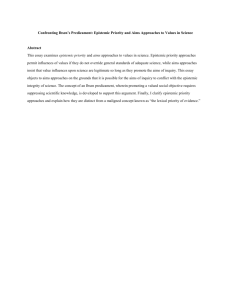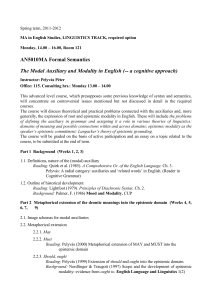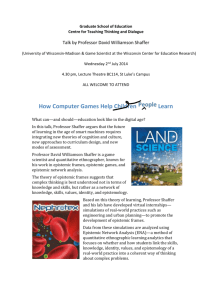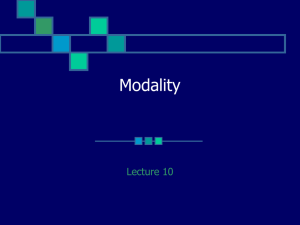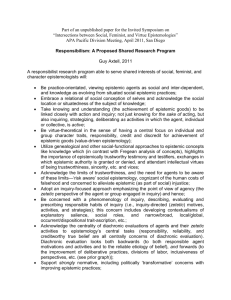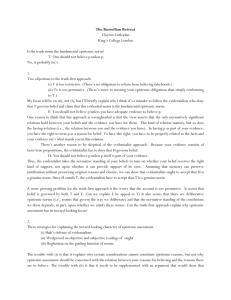Temporal Relations in Modal Constructions
advertisement
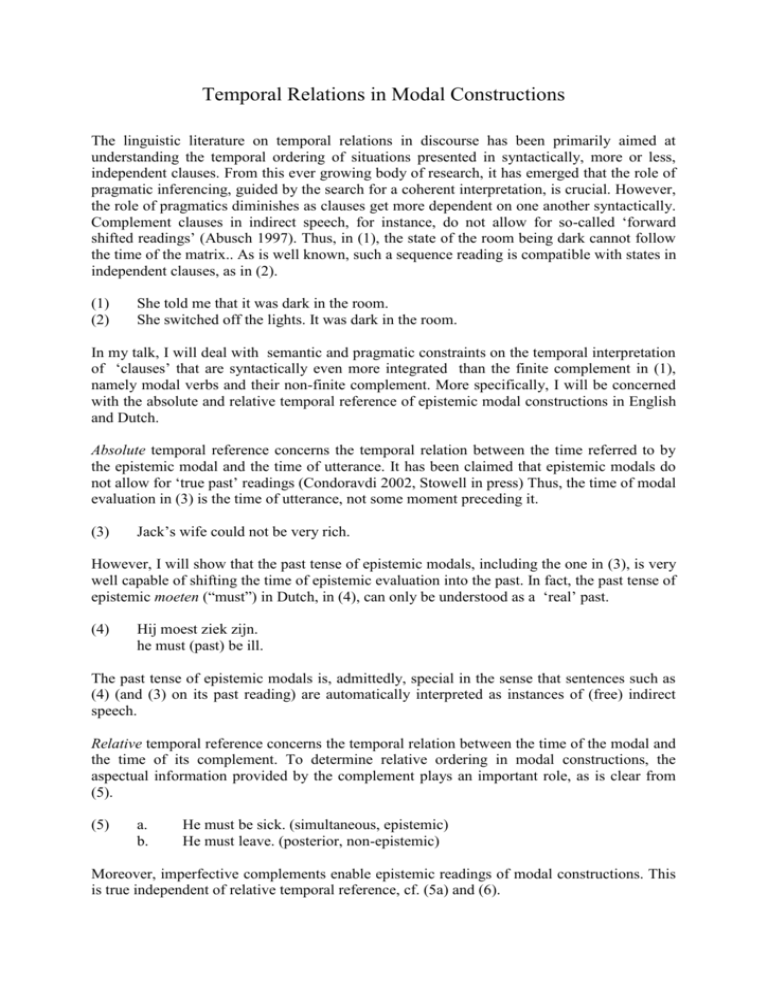
Temporal Relations in Modal Constructions The linguistic literature on temporal relations in discourse has been primarily aimed at understanding the temporal ordering of situations presented in syntactically, more or less, independent clauses. From this ever growing body of research, it has emerged that the role of pragmatic inferencing, guided by the search for a coherent interpretation, is crucial. However, the role of pragmatics diminishes as clauses get more dependent on one another syntactically. Complement clauses in indirect speech, for instance, do not allow for so-called ‘forward shifted readings’ (Abusch 1997). Thus, in (1), the state of the room being dark cannot follow the time of the matrix.. As is well known, such a sequence reading is compatible with states in independent clauses, as in (2). (1) (2) She told me that it was dark in the room. She switched off the lights. It was dark in the room. In my talk, I will deal with semantic and pragmatic constraints on the temporal interpretation of ‘clauses’ that are syntactically even more integrated than the finite complement in (1), namely modal verbs and their non-finite complement. More specifically, I will be concerned with the absolute and relative temporal reference of epistemic modal constructions in English and Dutch. Absolute temporal reference concerns the temporal relation between the time referred to by the epistemic modal and the time of utterance. It has been claimed that epistemic modals do not allow for ‘true past’ readings (Condoravdi 2002, Stowell in press) Thus, the time of modal evaluation in (3) is the time of utterance, not some moment preceding it. (3) Jack’s wife could not be very rich. However, I will show that the past tense of epistemic modals, including the one in (3), is very well capable of shifting the time of epistemic evaluation into the past. In fact, the past tense of epistemic moeten (“must”) in Dutch, in (4), can only be understood as a ‘real’ past. (4) Hij moest ziek zijn. he must (past) be ill. The past tense of epistemic modals is, admittedly, special in the sense that sentences such as (4) (and (3) on its past reading) are automatically interpreted as instances of (free) indirect speech. Relative temporal reference concerns the temporal relation between the time of the modal and the time of its complement. To determine relative ordering in modal constructions, the aspectual information provided by the complement plays an important role, as is clear from (5). (5) a. b. He must be sick. (simultaneous, epistemic) He must leave. (posterior, non-epistemic) Moreover, imperfective complements enable epistemic readings of modal constructions. This is true independent of relative temporal reference, cf. (5a) and (6). (6) - Will he be working here for a long time to come? No, he must be leaving (soon). (posterior, epistemic) In my talk, I will offer a unified explanation for these findings on the absolute and relative temporal reference of epistemic constructions in terms of aspect. I adopt an ‘anaphoric’ approach to the meaning of imperfectives (cf. Berthonneau & Kleiber 1994 and references cited): situations presented by means of an imperfective form need to be linked to a reference time (R) independently provided by the surrounding discourse. The anaphoric dimension is lacking from the semantic structure of perfective forms. For the ‘marked’ interpretation of past tensed epistemic verbs, the argument runs as follows: (a) modal verbs present states, (b) states in English and Dutch are standardly imperfective, (c) imperfectives require a reference time for their interpretation, (d) in the case of a past tense, R is often a point of perspective in the past (Boogaart 1999). Thus, the temporal interpretation of epistemic modals is not principally different from that of other lexical states, such as it was dark in (1) and (2), both of which get a perspectivized reading as well. To explain the lack of an epistemic reading for modal constructions containing a perfective complement, such as (5b), I will show that the presence of a reference point in the semantic structure is a prerequisite for any kind of ‘subjective’ reading arising, irrespective of syntactic environment. There can be no subjectivity if there is no point of view. In this respect, the incompatibility of perfective complements and epistemic readings, as well as the perspectivized reading of the past tensed modals discussed above, is arguably a manifestation of a much more general connection between aspect and modality (Fleischman 1995, Ippolito in press). Finally, if it is true that epistemic readings need a reference time, and that such a reference time is made available only by imperfective forms, then this would offer a straightforward explanation for the lack of an epistemic reading of perfect forms of modals in Dutch (and German). The sentence in (7) only allows for a non-epistemic reading. (7) ?Hij heeft ziek moeten zijn. lit. he has must be ill. In the perfect construction, the past participle expresses perfective aspect and does, therefore, not provide the reference time required for an epistemic interpretation of the modal. References Abusch, Dorit (1997). “Sequence of tense and temporal de re”. Linguistics and Philosophy 20, 1-50. Berthonneau, A. & G. Kleiber (1993). “Pour une nouvelle approche de l’imparfait: l’imparfait, un temps anaphorique méronomique”. In: Langages 112, 55-73. Boogaart, Ronny (1999). Aspect and Temporal Ordering: A contrastive Analysis of Dutch and English. Holland Academic Graphics, The Hague. Condoravdi, Cleo (2002). “Temporal Interpretation of Modals: Modals for the Present and for the Past”. In: David Beaver et al. (eds.) The Construction of Meaning. CSLI Publications. Fleischman, S. (1995) “Imperfective and irrealis”. In: J. Bybee & S. Fleischman (eds.) Modality in Grammar and Discourse. Amsterdam: John Benjamins, 519-551. Ippolito, Michela (in press). “Imperfect Modality”. In: Jacqueline Gueron and Jacqueline Lecarme (eds.) The Syntax of Time. MIT Press. Stowell, Tim (in press). “Tense and Modals”. In: Jacqueline Gueron and Jacqueline Lecarme (eds.) The Syntax of Time. MIT Press.


